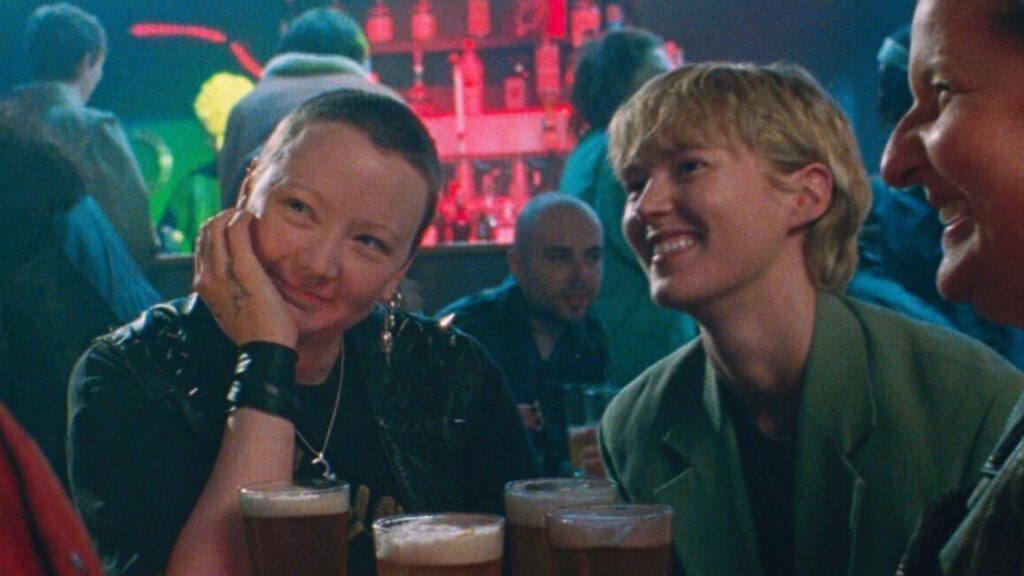Blue Jean review – Phenomenal Section 28 drama is vital viewing for politically disengaged
The jewel in the crown of 2023's BFI Flare: London LGBTQIA+ Film Festival is an an effective antidote to political apathy

The dark shadow of Section 28, which banned promotion of homosexuality by local authorities including schools between 1988 and 2000 in England and Wales… Hang on, are you still with us? Because this is really key for this review of epic female-fronted drama Blue Jean to make sense.
Enacted by Margaret Thatcher’s Tory government, the law fucked over LGBTQ teachers and students like you would not believe. Imagine, in this context, the risks involved in coming out in class; in protecting kids from homophobic bullying. Imagine the consequences, the accusations. Put it this way: set in 1988, Heartstopper would more closely resemble The Handmaid’s Tale.
And yet, 20 years on, people’s eyes glaze over with boredom or unfamiliarity at the mention of it. Why? Some are preoccupied with today’s all-consuming LGBTQ legal battles. Others (read: the privileged in our community) are happy enough in their quasi-equality for apathy to set in.
Others, I venture, disengage because what happened is incomprehensible. But this lack of empathy is in fact dangerous, because this shit is still happening. In Florida, for example, where Governor Ron DeSantis’s ‘Don’t Say Gay’ bill forbids classroom instruction on sexual orientation and gender identity, and Russia, where the ‘Gay Propaganda Bill’ soon turns 10.
Are we frogs in boiling water in the UK? Blind to the clear and present danger of such hate pervading our schools? Films like Blue Jean, then, provide a public service against such amnesia. This story of lesbian P.E. teacher Jean from up north navigating every mind-boggling complexity of such a law – where every interaction with a partially-clothed teenager in the changing room is anxiety-inducing; where the hell is safe to look? Does avoiding eye-contact only invite scrutiny? – is fiction but feels like testimony. It suggests extensive research during pre-production; meaningful exchanges with the people who lived and breathed these draconian times. And it’s all acted and presented in such a breathtakingly, entertainingly real way. As such, it illustrates the hideousness of the situation more effectively than a documentary might do.
It helps that Blue Jean‘s lead star Rose McEwan is such a mesmeric presence. Spiky blonde crop, unnervingly beautiful face – she’s a mix of Rosamund Pike’s glacial calm and Agyness Deyn’s supermodel cool. Hell, she even looks hip when scrubbing the kitchen sink. (Director Georgia Oakley, in fact, gives the whole of 80s Newcastle a This is England-style ugly-pretty sheen: the dive bars, the house parties, and the graffitied streets are all pleasingly ‘editorial’. That said, none of the dull, washed-out press shots available communicate this, and the film’s Bowie-referencing name Blue Jean again rather fails to telegram its message and amazingness. In this reviewer’s opinion, anyway.)
What I love most about McEwan’s performance are her emotional vicissitudes in the final act. For the first two-thirds of the film, Jean’s secretive, closed-off nature calls for a chilly stoicism, which the star conjures effortlessly. No one serves ‘grim look of resignation when presented with a no-win scenario’ like this actor. Then, just as you begin to question whether the performance is one-note, she delivers two sucker punch scenes: the first, a desperate, panicked relationship breakdown, and the second, a virtuoso cry-laugh moment that is cleansing to witness. Sally Field would be proud. (This is a reference to the astonishing Steel Magnolias, in case you don’t know. And Dolly Parton’s infamous line: “Laughter through tears is my favourite emotion.”)
Elsewhere, Kerrie Hayes is the charismatic heart and soul of the film, as Rosy’s on-off girlfriend Viv. For the role, Hayes undergoes a visual transformation worthy of a Drag Race queen. Albeit in reverse, from femme to masc. The character – a combination of no-nonsense political militancy, cheeky, charming sex appeal and thinly-veiled, big-hearted softness – is as sharply defined and perfectly played as McEwan’s. Lucy Halliday, meanwhile, knocks it out the park as Jean’s burgeoning baby gay student Lois: all wide-eyed wonder and furious indignation when her teacher – her older lesbian spiritual sister – fails her at a pivotal moment in her life.
The writing, also from Oakley, is sublime and thrillingly unpredictable. There’s a perspicacious plot twist at its centre – one hell of an ethical dilemma – that perfectly sums up Jean’s wider predicament. One ominous zoom-out in a pub later suggests she’s taken one tack… And feels like the final scene. (A thoroughly despairing ending it would’ve been, too. But one I’d have been satisfied with.) Then, the movie goes in a different, unexpected direction.
Later, the aforementioned cry-laugh catharsis also feels conclusive, with McEwan’s face bathed in restorative sunlight. But no – there’s even more to come. Let’s hope the same is true of the people who put Blue Jean together.
5/5
